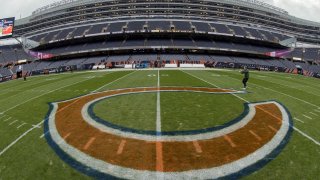
The Chicago Bears teamed up with Advocate Aurora Health and the National Football League to send vaccinated health care workers to the Super Bowl.
Four Chicago area health care workers have received the chance to attend Super Bowl LV in Tampa Bay on Feb. 7, according to a release.
“Our frontline team members provided healing and hope as they worked through the pandemic to keep their communities safe and healthy. Now they’re leading the way again, showing that getting the COVID-19 vaccine is our way out of the pandemic and back to the activities we love,” Advocate Aurora Health Chief Marketing Officer Kelly Jo Golson said.
Golson said the experience and partnership with the Bears aims to help workers who have given much of themselves during the pandemic, while also promoting vaccinations statewide.
Here's a list of the health care workers participating in the experience:
- Shawndra Ferrell, home health nurse with Advocate Trinity Hospital
- Carl Paige, facility operations at Advocate Trinity Hospital
- Alicja and Jacob Salman, hospitalists at various Advocate Aurora locations
Illinois and Chicago will both enter the next phase of their vaccination plan starting Monday, according to health care officials.
Local
Phase 1b, which includes roughly 3.2 million residents, centers on residents age 65 years and older and "frontline essential workers," including first responders, education workers like teachers and support staff, childcare workers, grocery store employees, postal service workers, and others.
Illinois health officials announced Friday the launch of a statewide coronavirus vaccination appointment sign-up addition to their website.
While residents can already access the state's coronavirus website, appointments aren't yet available. Once appointments become available, residents can access a link taking them to their local health care provider to coordinate when and where to receive the vaccine, officials said.
Pritzker noted that some pharmacies, such as Walgreens, already have an appointment website live online, with others are expected to follow shortly.
Here's a full look at who will be included in Phase 1b:
- Residents age 65 and over
- Frontline essential workers, which means "residents who carry a higher risk of COVID-19 exposure because of their work duties, often because they are unable to work from home, and/or they must work closely to others without being able to socially distance. This includes:
- First responders: Fire, law enforcement, 911 workers, security personnel, school officers
- Education: Teachers, principals, student support, student aids, day care worker
- Food and agriculture: Processing, plants, veterinary health, livestock services, animal care
- Manufacturing: Industrial production of good for distribution to retail, wholesale or other manufactures
- Corrections workers and inmates: Jail officers, juvenile facility staff, workers providing in-person support, inmates
- USPS workers
- Public transit workers: Flight crew, bus drivers, train conductors, taxi drivers, para-transit drivers, in-person support, ride sharing services
- Grocery store workers: Baggers, cashiers, stockers, pickup, customer service
- Shelters and day care staff: Homeless shelter, women’s shelter, adult day/drop-in program, sheltered workshop, psycho-social rehab
In Chicago, there are four ways in which residents will be able to get vaccinated, the city's top doc said this week.
Chicago Department of Public Health Commissioner Dr. Allison Arwady said options include through a medical system or health care provider, through pharmacies, through a dedicated vaccination location like the points of dispensing sites, or through an employer.
While anyone who qualifies for the vaccine in the next phase is eligible to receive it, Chicago's Phase 1b aims to prioritize certain populations, Arwady said.
In February, depending on vaccine availability, the city will then shift to making vaccines available to employers of grocery store workers and manufacturing and factory settings.
After that, later in February, the city plans to direct vaccine to employers of daycare workers and educators.
"K through 12, early childhood educators, private parochial public - doesn't matter. All educators are going to be prioritized with planning a little bit later in February," Arwady said. "And that is well underway right now."
Heading into March, again depending on vaccine availability, vaccines expand to employers of public transit workers, agriculture workers, government workers, postal workers and more.
Though Illinois has not yet determined dates for future vaccine phases, Chicago officials said Phase 1c could come at the end of March and Phase 2, which includes all residents over the age of 16, could begin May 31.
Chicago officials say the best way to get updates on the vaccination rollout is through "Chi COVID Coach," a platform the Chicago Department of Public Health is using to monitor symptoms, giving information on testing in the city and help you get the latest details on the city's vaccination plan - including notification when you can register to get your vaccine.



